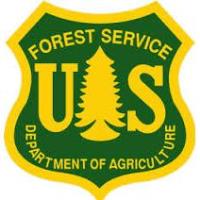Fighting Fire During Covid-19: Fire Danger Rating Rises to High on the Lincoln National Forest
May 07, 2020

Fighting Fire During Covid-19:
Fire Danger Rating Rises to High on the Lincoln National Forest
Fire Danger Rating Rises to High on the Lincoln National Forest
Alamogordo, NM – May 6, 2020 – Rising temperatures and a lack of precipitation have led fire
officials on the Lincoln National Forest to raise the fire danger rating to high. A high fire danger
rating means fires can start easily from most causes. Grasses and pine needles will easily ignite and
campfires and brush fires are likely to escape. Fires can become serious and difficult to control
unless they are put out while they are still small.
Fire season in the southwest typically runs from April through early July or until monsoonal rains
arrive. Fire restrictions prohibiting campfires have been in place since April 15 on all New Mexico
National Forests including the Lincoln National Forest.
With low fuel moisture levels and other indices pushing many areas of the state into high fire danger
and the recent surge of quarantine-weary visitors to the forest, the risk of human-caused wildfire is
rising. Despite the campfire ban, fire patrols reported numerous illegal fire campfires last weekend
and law enforcement officers ticketed multiple illegal campfires. Fortunately, none of the prohibited
campfires got out of control.
“We’ve seen a huge uptick in forest visitation since the pandemic began. While most people are
following the rules, we unfortunately have a small subset of visitors who knowingly disregard them,”
said Acting Fire Staff Dave Bales.
Fighting Fire During Covid-19
“The Lincoln National Forest and our local partners stand together, ready to respond to wildfireduring the 2020 fire year. Health concerns related to the COVID-19 pandemic may affect how
we fight fire, but it will not alter our commitment to protect local communities and our public
land, " stated Forest Supervisor Travis Moseley.
While the COVID-19 outbreak is unprecedented, wildland fire personnel are emergency responders
and are trained to adapt to changing situations. The Forest Service’s primary fire response strategy
for 2020 will be aggressive initial attack using local resources from all available partners.
"Our goal is rapid containment to minimize the number of large wildfires and prevent the need to
bring large numbers of firefighters together," said Acting Fire Staff Dave Bales.
Firefighters will respond to every wildfire, but to prevent the spread of COVID-19, how they are
mobilized and supported will be different this year.
For larger fires that could not be stopped during initial attack, it is very apparent that gathering
and supporting large numbers of firefighters in compact fire camps will not be practical for this
fire year. In the past during a large wildfire it was typical for dozens or even hundreds of fire
personnel to be based out of large fire camps. This will not be the norm this year. Most
firefighting efforts will be in small groups and fire resources will base out of small isolated camps
to provide better social distancing. Wildland fire agencies are also identifying support functions
that can be done virtually to prevent the transmission of the virus.
"Social distancing among firefighters wherever possible, spreading out fire camps, issuing PPE
such as masks and gloves, screening and testing firefighters, and developing more contracts for
logistical support to these less dense organizations are all considerations built into the agency's
firefighting plans this year, " explained Bales.
How You Can Help
The most important thing members of the public can do to help during the 2020 fire year is to
do their part to prevent human-caused fires. Fewer human-caused fires will not only help
protect communities from wildfire but will also preserve firefighting resources and help slow the
spread of COVID-19 by reducing the need to move firefighters throughout the nation.
• Follow fire restrictions.
• Do not allow chains to drag on the road. It can cause sparks and inadvertently start a wildfire.
• Do not throw cigarettes out your car windows.
• Do not burn debris on windy days.
• Be mindful of grills, camp stoves and lanterns.
Contact:
Laura Rabon
laura.rabon@usda.gov, 575-434-7290
